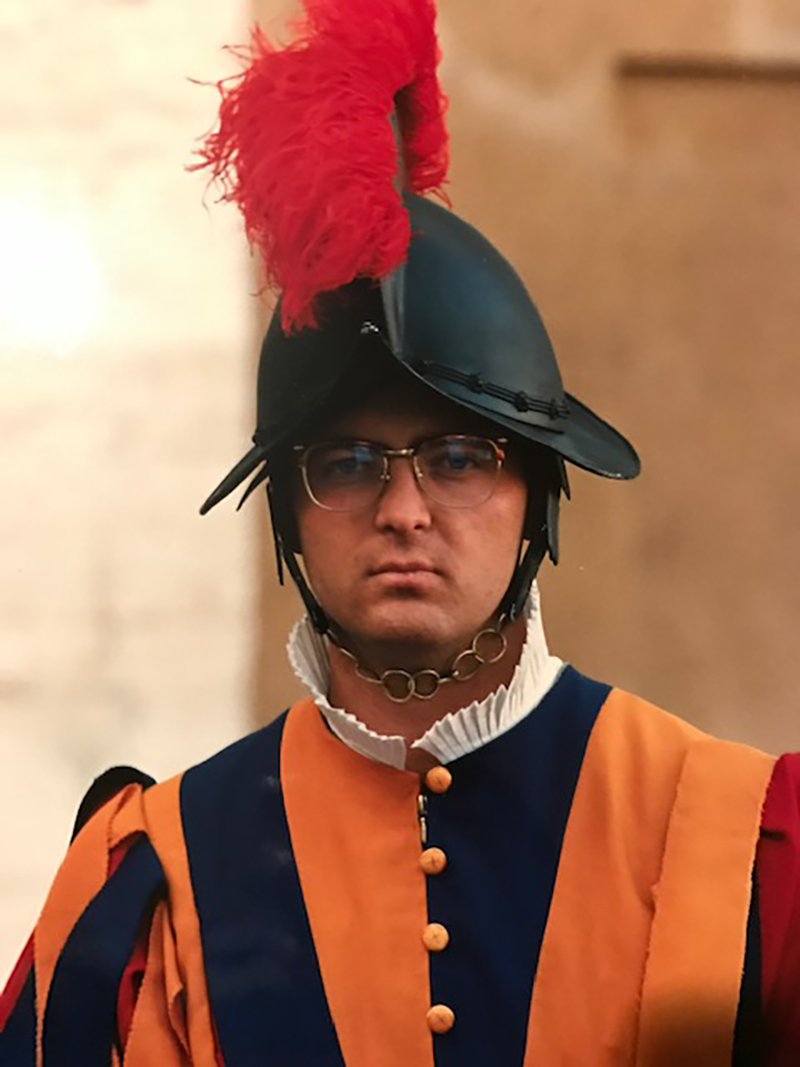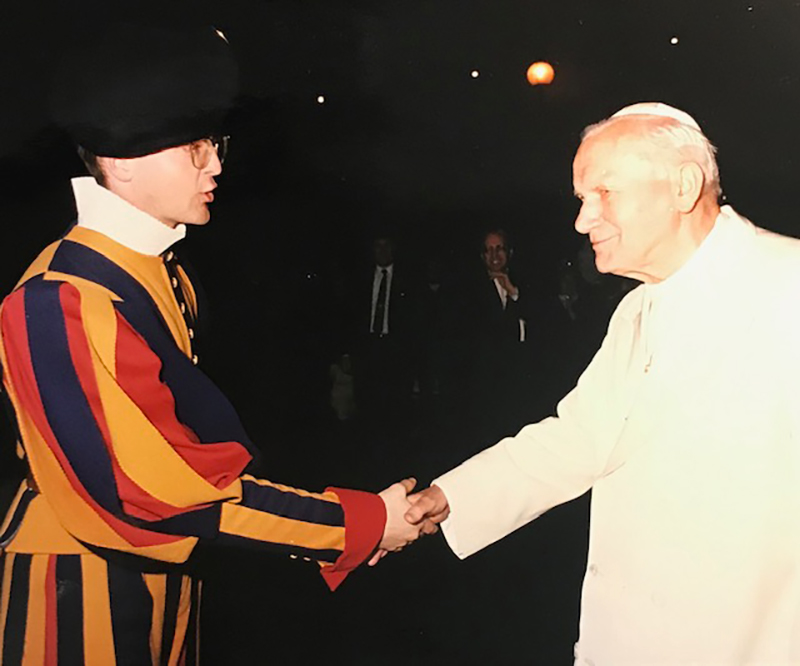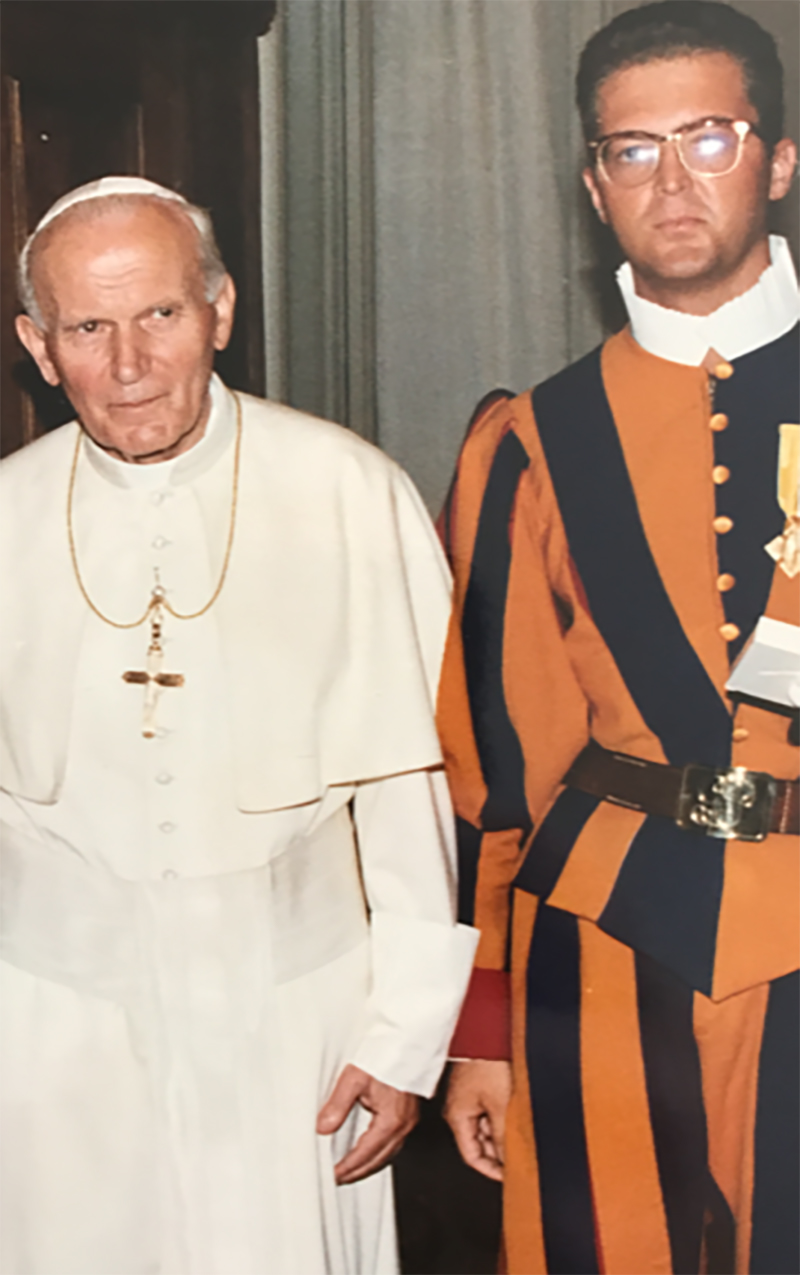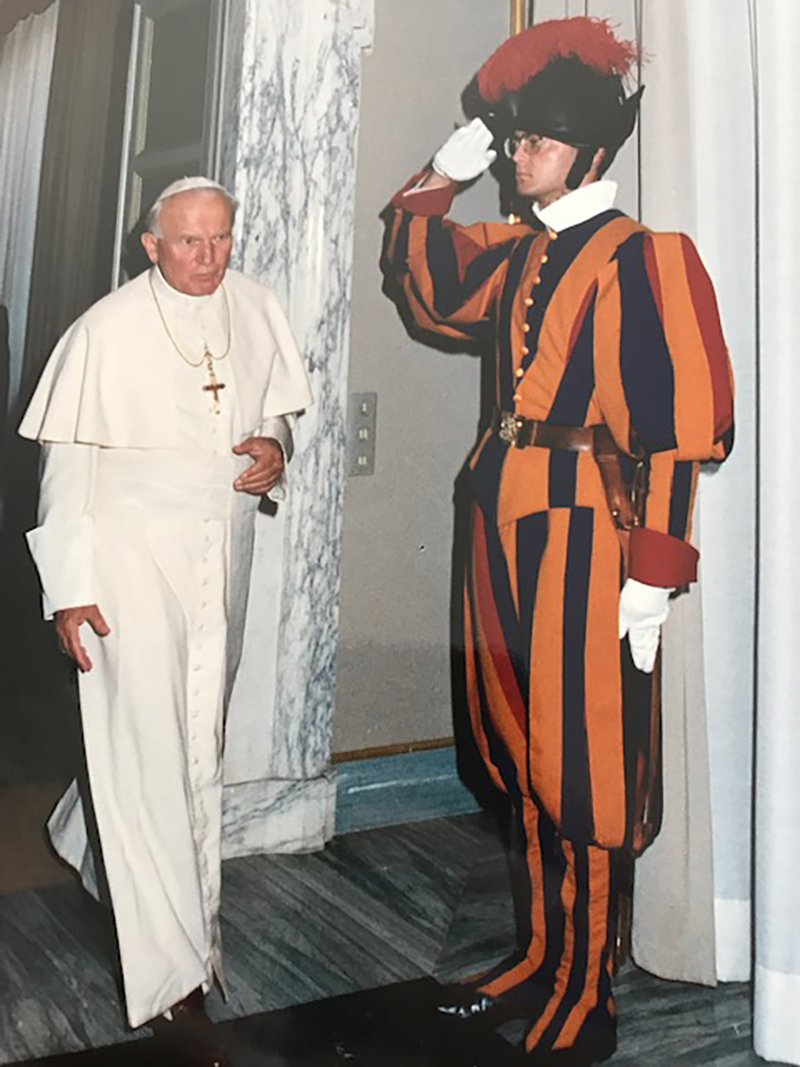Mario Enzler weaves stories of former pope with lessons he learned as a young man in his service.
Lenten Campaign 2025
This content is free of charge, as are all our articles.
Support us with a donation that is tax-deductible and enable us to continue to reach millions of readers.
May 18 marks the 100th anniversary of the birth of Pope St. John Paul II. Thousands of people around the world will be able to look back on a time when they personally met with the man who was pope from 1978 to 2005, one of the longest pontificates in history.
Mario Enzler is recalling the pope in a special way. A former Swiss Guard, Enzler served in the Vatican from 1989 until 1993. In a new book, I Served a Saint: Reflections of a Swiss Guard in honor of the centenary of the birth of St. John Paul II, Enzler weaves his reminiscences of encounters with John Paul with lessons he learned from the Polish pontiff. The book, published by Newman House Press, has a foreword by papal biographer George Weigel.

Enzler was not a typical Swiss Guard, since he was not born in Switzerland, but in Bergamo, in northern Italy. After his service, he also worked as a financial advisor at the Vatican. Eventually moving to the United States, he and his wife and children settled in New Hampshire, where he founded a classical curriculum high school.
He also began teaching at the Busch School of Business at the Catholic University of America. While there, he noticed the need and demand for clergy to learn practical business and managerial skills. To answer this need, Enzler in 2017 created the Master of Science in Ecclesial Administration and Management (M.E.A.M.), an interdisciplinary program that connects the resources of the Busch School, School of Theology and Religious Studies, and School of Canon Law in order to cultivate the talents of its participants so that they can be more effective shepherds.
Enzler spoke with Aleteia about his encounters at the Vatican with Pope St. John Paul II.
How did you come to be a Swiss Guard and serve Pope John Paul II?
I was born and raised in Bergamo, in northern Italy. When I finished graduate school, I didn’t know what I wanted to do. It was my dad who told me I need some sort of structure in my life, and in order to get that I should join an army. I say an army, because being born in Italy, I had Italian citizenship, but because my dad was Swiss I also had a Swiss passport. After looking into it, the Swiss opportunity sounded better to me. And I really didn’t care about having an Italian passport, because my Italianity is inclusive in the way I am and the way I talk and communicate.
So I ended up joining the Swiss Army.
While I was in the army, I got approached by somebody saying “In Rome they’re looking for people, and we believe you fit the profile.” They were talking about the Swiss Guard. I said, “I know very well who the Swiss Guard are, but I don’t picture myself dressed up as a clown, standing still for hours without talking to anybody.” The person started laughing and said, “Well, that’s just a little bit of the job description of what a Swiss Guard is, but first and foremost, the Swiss Guard, since January 22, 1506, which is when they were established by Julius II, have carried a noble title, and it’s three Latin words.” My undergraduate degree is in classics, so when he said Latin words, I said, “Oh, tell me those words.”
“Defensores Ecclesiae libertatis — Defenders of the Church’s freedom.” I said, “Wait a minute. I didn’t even know that anybody wants to take away the Church’s freedom. Why? I need to know more about this.”
So you joined, obviously. How was it? What was your first encounter with John Paul?
What transformed my mind and heart was the first real encounter I had with Pope John Paul II. I was in the apostolic palace, and they told me he was going to walk by, so you have to follow the protocol of securing the place, closing the door. You block the elevator so nobody comes up to the third floor. When he walked by, I was at attention, and he stopped. And he looked at me and put his hand forward like he wanted to shake my hand. So I came out of attention and grabbed his hand, and he said to me, “You must be a new one,” and I said “Yes, Your Holiness,” and introduced myself. And then he grabbed my hand also with his left hand, so all of a sudden he sandwiched my hand with both his hands and looked at me and said, “Well, thank you for choosing to serve the one who serves.” And then he left.
That day I started realizing, “This is bigger than I thought. This man is definitely different than anyone I ever met. What did he mean by that?” I think he read my heart in a nanosecond. He knew exactly what he had to say in order for me to hear his voice.

There was a lot going on in the world during the time you served, with the fall of the Berlin Wall and the breakup of the Soviet Union.
Oh yes. I was in the apostolic palace when [Soviet leader Mikhail] Gorbachev came. I saw [Polish Solidarity leader and subsequent Polish President] Lech Walesa come more than once, incognito, maybe for a meal.
Going back to when his name started coming out during the conclave [that elected Karol Wojtyla as pope in 1978], I suspect that he saw that his leadership could have helped his native Poland — and all of Eastern Europe — to come out from [Soviet] tyranny and so on. He was a political mind, extremely astute. But always focused on the Eucharist. I don’t think he ever led anything by emotion. He always led by intellect.
Also, I was there during Operation Desert Storm. When [Gen. Norman] Schwarzkopf [led the invasion of Iraqi-occupied Kuwait]. …It was a Wednesday audience. I had just heard on my radio that there was the attack. When the pope and Msgr. Dziwisz came out from the audience, they had to cross where I was, in the apostolic palace, and Dziwisz asked me “Any news?”
“Yes, they attacked.”
And he turned and told the pope. And I saw a huge suffering come across His Holiness’ face.
The pope always had people for lunch. Sometimes it was the last audience he had, and they would go from the second floor up to the third floor for lunch. If they came exclusively for lunch, they would have to come through us, and we would have to give them access through a service elevator, so they could go straight up into the apartment. I was able to see many people coming for lunch, who at that time I wouldn’t have given it much thought.
Any visitors stand out in your memory?
He had a very close friend named Wanda Półtawska, who had been in [the Nazi’s Ravensbrück] concentration camp: the Germans tried all kinds of poisons on her. She was very close to the pope. She and her husband, sometimes with their children and grandchildren, would spend all summer [at Castel Gandolfo]. I saw the two of them interacting. I think that with Wanda he had a special connection. I was privileged to witness that — this relationship with a woman he respected and cared for, and she was a very humble woman who went through a lot of suffering.
The relationship was like brother and sister. They respected and loved one another through Christ.
What’s it like being a Swiss Guard in proximity to the pope?
The job of the Swiss Guard varies throughout the day. You spend lots of hours alone, like at gates, letting people in and out, lots of hours in the apostolic palace, making sure that everything is smooth and safe. You have a lot of events where you’re just part of the protocol. You don’t interact with His Holiness.
But then there might be other events, maybe with smaller groups, and he’s right there. His Holiness would always find his way to come and express his gratitude for our service to the Successor of Peter, or you would exchange a few words. I never sat down and discussed the Summa Theologia with John Paul II; we just had random conversations on life, weather, sports, food, on simple things.
And every single time I saw him I would always feel emotional. Every single time I spoke with him I would be afraid. I knew that he was different. I knew that he had a glow about him. And every time he looked at me with his blue eyes, I could tell that he was looking at me. Somebody once asked me “What is it to be a saint?” And I always say, “Well, I spent a lot of time with him and a lot of time with Mother Teresa, and the two of them had something in common, which was when they were talking to me they were focused entirely and solely on me.” A saint focuses on one person at a time. How many times we talk to people and we’re thinking about a million other things or we’re looking at things around the person or whatever. But with His Holiness I always had the feeling that I was the center, and his attention was on me.
So spending time with him was always an emotional journey for me and an opportunity. Sometimes I would be in his presence and I would not talk but would observe his interaction with people. I would pay attention to what he would say and observe his posture. It was important to me to see how he would stand and move his hands, the voice, how he would emphasize certain concepts or slow down. He was an amazing orator.

Or watching when he would celebrate Mass — big ones in St. Peter’s or small, private Masses — always going into this state of awe, like he would be completely away and transported somewhere else. Being next to him was an adventure. He would go into deep prayer.
What did you learn from observing that?
I learned that prayer is important, and when we pray we have to be focused on what we’re doing, rather than just do it because we have to do it. Prayer is an open dialogue. Most of the time, we just have to be quiet; we have to wait and listen. At least in my experience, God many times whispers, and so you need silence. You need to be able to pay attention to even small signals or small words or small images that God puts in your heart or mind. I learned that when I pray, that’s an important moment, so everything is going to be out. I’m not going to let the phone distract me; I just have to focus while I pray.
Did you feel like he came to really know you? Do you feel that he could see into your heart, into your private sphere?
No doubt about it. The uniqueness of His Holiness was that if he would walk by, and you were there at attention, and he would stop and look at you, and he would not say a word for maybe 10, sometimes even 15 seconds. He would just stand in front of you and stare at you, which, for a guard, was a little annoying, because you could not get out of your attention. You could get out of attention only if he talks to you.

So to me, when he would look at me with his blue eyes — with the intensity of a blue that I can still not identify in any other person — I would really shake, “Wow he’s looking into me.” If I had done something the night before that I was not proud of, I would think, “Oh, he can see that.” So many times I felt he could see through me like an MRI.
What could a Swiss Guard possibly do that he wouldn’t be proud of? Weren’t you under tight supervision and control?
Well, if it’s going to be your day off and you end up going to the Irish pub, maybe you meet some of the Americans and some of the Irish, and you could have a few too many. You have a curfew, but then all of a sudden you get back late, and the guard who is at the gate has to open to let you in, and he has to report that you got in late. And maybe he’s your best friend, so you ask him to, “Okay, this didn’t happen, right?”
Did you learn anything about yourself, through your interaction with him?
Absolutely. The most important thing that I learned is that sacrifice is redemptive. I feel that that’s exactly what I learned, watching him, reading what he was saying, being in his presence. He was in a lot of pain; suffering was in his heart a higher gospel, and the message I took from there is that sacrifice is redemptive because there is a deeper reward when and if we make sacrifice for the sake of a higher purpose and in service to others. I took that and made it like my motto. I always give everything I have; I’m not afraid of suffering; I’m not afraid of sacrificing; this is the way I’m parenting my five children, I’ve been living my marriage for the past 27 years. I’m not afraid to say that I have been asking God for the grace to become courageous and to not be afraid of suffering.








